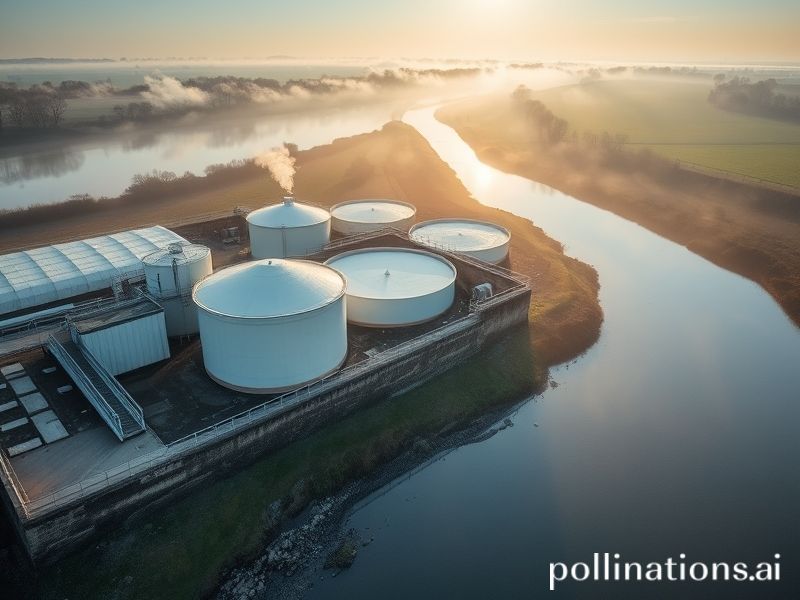Severn Trent: How England Perfected the Art of Selling Rain Back to Itself
Severn Trent and the Art of Selling Rain Back to the English
By Dave’s Locker Foreign Correspondent, filing from a damp pub in Shropshire with Wi-Fi worse than a Siberian gulag.
There’s something beautifully perverse about Severn Trent Water—Britain’s sixth-largest water company—declaring record profits last year while England simultaneously endured hosepipe bans so draconian that suburban gardeners began naming their wilting petunias after lost lovers. Picture it: a soggy island where it rains 160 days a year, and somehow the taps still run dry. If that doesn’t sum up late-stage capitalism, what does?
Globally, the Severn Trent saga reads like a cautionary fairy tale told by a drunk hydrologist. From Singapore’s NEWater plants, where every drop of sewage is lovingly coaxed into drinkability, to Israel’s drip-irrigated deserts, the world’s water nerds look at the English Midlands the way a Michelin chef looks at a Pot Noodle: equal parts pity and fascination. How do you mismanage a resource that literally falls from the sky? The answer, of course, is privatisation, that exquisite British export now doing the rounds from Manila to Maputo like a cold sore at a swingers’ convention.
Severn Trent itself is no longer merely a regional utility; it’s a transnational parable. Its shareholders—many domiciled in the usual palm-fringed secrecy jurisdictions—collect dividends while the company leaks 460 million litres a day, enough to fill 184 Olympic pools or, if you prefer, one moderately ambitious Bond-villain lair. In the global south, where 2.2 billion people still lack safely managed water, that statistic elicits the sort of hollow laugh usually reserved for UN climate conferences after the open bar closes.
Yet Severn Trent’s genius lies in its ability to spin leakage as a growth market. Enter “smart meters” and “leakage reduction AI,” two phrases now liberally sprinkled through investor decks like truffle oil on chips. The same algorithms that can’t stop a Victorian pipe from rupturing beneath Wolverhampton are being marketed to utilities from Jakarta to Johannesburg as the future of H₂O. Call it disaster capitalism with a Yorkshire accent: first you create the scarcity, then you sell the solution, preferably back to yourself via a Cayman subsidiary.
The geopolitical implications ripple outward. Water-stressed Jordan has begun eyeing British desalination tech like a thirsty man staring at someone else’s beer. Meanwhile, Scottish nationalists cite Severn Trent’s pollution incidents—57 serious breaches since 2020—as evidence that London can’t be trusted with anything wetter than a gin and tonic. Even the EU, supposedly rid of Brexit Britain, still monitors the River Wye’s nitrate levels with the morbid curiosity of a pathologist watching a chain-smoker cough.
Back home, the company’s PR department has gamely rebranded sewage overflows as “dilution events,” a euphemism so shameless it could only have been cooked up in the same London ad agencies that once billed apartheid as “separate development.” Customers, locked into a monopoly by geography rather than choice, respond with the stiff upper lip of a people who once rationed bananas like uranium. Some install rainwater harvesting systems, effectively paying twice for the same cloud. Others simply pray for fewer fatbergs, those greasy subterranean whales composed of lard, wet wipes, and shattered dreams.
And still the dividends flow—£568 million last year, enough to buy every person in Birmingham a moderately depressing pint. The CEO insists this is “rewards for efficiency,” a phrase that sounds better in the original Klingon. Meanwhile, Ofwat, the regulator, performs its statutory role of furrowing brows and gently tutting, like a vicar who’s discovered gin in the font.
In the end, Severn Trent is less a utility than a global allegory: how to monetise the commons until the commons resemble a Superfund site. From California’s almond orchards to Chennai’s dry taps, the lesson is clear—if you can sell rain back to the English, you can sell anything to anyone. And when the last river coughs up its final plastic bag, we’ll no doubt be offered a premium subscription to the memory of water.
Until then, dear reader, raise a glass (bottled, naturally) to human ingenuity. Or, as Severn Trent’s next advert will probably put it: “Hydration. It’s not just for the living.”







